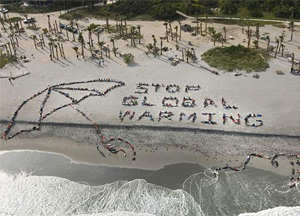 |
 |
 |
 Editorials | Environmental | November 2006 Editorials | Environmental | November 2006  
UN Conference Hears Urgent Calls for Action on Global Warming
 Otto Bakano - AFP Otto Bakano - AFP


| | Over 300 South Floridians braved gale-force winds blowing off the ocean to call on congressional candidates to effectively tackle global warming by creating a mass aerial art image of a flooding Florida and a drowning giant human. |
Environmentalists and officials from around the world opened a UN climate change conference with appeals for urgent action to curb global warming that threatens billions of people on the planet.

"Climate change is rapidly emerging as one of the most serious threats that humanity has ever faced," Kenyan Vice President Moody Awori said at the start of the United Nations meeting, the first to be held in Africa, the continent most at risk.

"There is a great task ahead of us," he told delegates to the two-week Conference of Parties to the UN Framework Convention on Climate Change (UNFCCC), which is expected to draw 6,000 experts, officials and lobbyists from 189 nations.

"Climate change threatens catastrophic impacts that will transform the world we live in," European Union delegation head Stavros Dimas said in a statement echoed by others.

"The worst impacts of climate change can be prevented only if governments act now," said Steve Sawyer of the environmental watchdog Greenpeace.

"Future generations will not forgive us if we delay," he said. "The legal, moral and political obligations of the rich are clear - they must dramatically reduce their emissions."

Experts warn global warming is having and will have the largest impact on Africa, where some 800 million people are increasingly threatened by unpredictable weather patterns, floods and droughts.

Unless steps are taken to help African countries, some 480 million people on the continent may face water security problems by 2025 and 25 to 40 percent of species' habitats could be lost by 2085, according to a UN report released Sunday.

The meeting in Kenya is to discuss what steps to take after the UN Kyoto Protocol on curbing greenhouse gas emissions expires in 2012. It will seek to convince top polluters who have not ratified the treaty to do more to stop global warming.

As the conference got underway, environmental groups issued a string of bleak assessments about the global dangers posed by climate change, particularly for developing nations, many of them in Africa.

"Climate change is starting to hit home and we can clearly see the first impacts here in eastern Africa," environmental group WWF said. It warned of food and water shortages, malaria outbreaks and conflict over scarce resources.

Industrialized countries whose leaders signed the Kyoto Protocol but whose parliaments have failed to ratify it will also be put under the spotlight, activists said.

These include the United States, the world's biggest single polluter, and Australia, which is the biggest polluter on a per capita basis and a major supplier of fossil fuels, such as coal, which cause global warming.

But Washington said there would be no change in its rejection of Kyoto until at least the end of US President George W. Bush's second term in office in January 2009.

"I certainly (have) no indication that there is any change in our position or there is likely to be during this presidency," the acting head of the US delegation Harlan Watson told reporters.

Washington says it is pursuing alternative measures to deal with global warming and Watson said the United States was working within the UNFCCC to promote "science-based" and "sensible action on climate change."

Kyoto - which only demands commitments from the industrialized world - has been hamstrung by the refusal of some major industrialized nations to take part and by the uncontrolled release of greenhouse gases from developing nations like India, China and Brazil.

Experts warn that the treaty in its present form will not even dent the problem.

The Nairobi summit will also address ways in which rapidly industrializing countries such as India, China and Brazil can minimise the environmental damage of their economic progress.

Despite being the world's second largest single polluter, China is still exempt from commitments to slash its greenhouse gas emissions because of its status as a developing country.

Kyoto came into effect in February 2005 with much fanfare. It was intended to commit industrialized countries to bringing their greenhouse gas emissions to an average of five percent below their 1990 level, by a deadline of 2012.

A report last week by former World Bank chief economist Sir Nicholas Stern said the costs of unrestrained global warming could be far worse than the measures needed to slow it down

The Stern review estimates that worldwide inaction could cost the equivalent of between five and 20 percent of global gross domestic product every year, forever. | 
 | |
 |



